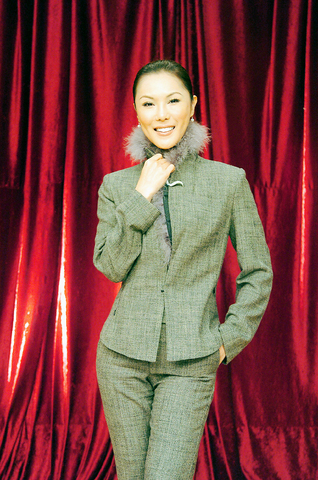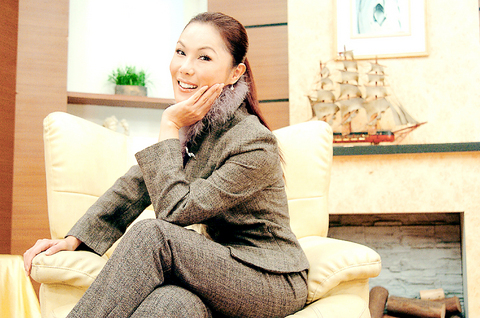As the most instantly recognizable host of the Eastern Media Group's Shopping Channel (東森購物), Li Jing's face is beamed into millions of households seven days a week. And since she first stepped in front the camera to peddle jars of dried mushrooms and other popular shopping channel products, she has become a phenomenon.While Li Jing has no plans to relinquish her title of "Queen of the Shopping Channel" anytime in the near future, she will be branching out in the coming months.
The first glimpse the public will get of the "new" Li Jing will be on Star TV, when she takes center stage and hosts an hour-long talk show based on the hugely popular Oprah Winfrey Show.

Set to debut on Star's variety- show channel sometime in the coming months, the yet-untitled show will, according to its host, offer something for everyone and be filled with humor, gossip and plenty of real-life drama.

PHOTOS: GEORGE TSORNG, TAIPEI TIMES
"I get a lot offers to shoot programs, but I like to protect myself and be careful before saying `yes' to any offer," she said. "The new show will be funny and cover a lot of diverse and interesting themes and topics."
Regardless of any career move Li Jing may choose to take in the future some things will, no doubt, remain the same.
Over the past five years Li Jing (利菁) has became one of Taiwan's most talked-about and pursued celebrities. The paparazzi and gossip-column journalists follow her every move, and hardly a day goes by without her name appearing in at least one of the nation's dailies or glossy gossip weeklies. The nation is now so accustomed to its exceptional television host that gossip column writers and cable news networks will continue to be more than happy to devote column inches and airtime to the "Queen."
She has her own fan club, she receives scores of letters offering praise and encouragement in any given week, and whenever she steps outside she's mobbed by throngs of adoring fans eager to catch a glimpse of, or cadge an autograph from, "The Queen of the Shopping Channel."
Like so many before her, Li Jing dabbled in several fields before shooting to stardom. She was the spokesperson for a popular brand of cosmetics; she was a dancer; she was a choreographer; she appeared in television soap operas, and she also tried her hand at singing, though she readily admits today that she "doesn't have very good vocal chords."
But what really sets the witty and self-assured television host apart from her many peers is the fact that she used to be a he.
"When I was young I knew everything was wrong. I had the physical desire to be a girl in my heart because I knew I wasn't like the other boys," said Li Jing. "Although I had both male and female thoughts, it was my feminine hormones that had a stronger influence on the way I acted. I hated being touched by the boys and I felt alienated."
Li Jing physically and officially became a female shortly before entering the English Literature Department of Suchow University at age 19. Not everybody, however, had been forewarned. Her freshman year at university proved a grueling and uncomfortable experience.
"I obviously looked like a women, but the [university's] paperwork still said I was a man. It was such a shock that I tried to kill myself," she said.
It was while studying at university that Li Jing made her first tentative steps to superstardom by taking a part-time job as a model. By the time she graduated from university, Li Jing had already become a popular figure in the fashion industry.
In order to escape the glare of publicity that has followed her since leaving university and becoming a household name, Li Jing travels to Paris and the US at least twice a year to purchase the latest fashions and enjoy brief respites of anonymity.
She might enjoy being away from the limelight for short periods of time, but when she returns to Taiwan it is now impossible for Li Jing to escape the
realities of who she is.
Mobbed by fans when leaving the studio or while grocery shopping near her home in Hsichih, she now enjoys movie-star-like status and receives scores of letters from her army of devoted fans on a daily basis.
"I do get mail from men telling me how much they love me, but most of my fan mail comes from women," she said. "They write to encourage me or tell me how much they admire me or to ask about the clothes they've seen me wearing on television and ask where they can buy them and so on."
Not everyone is as gracious or as adoring as her doting fans. Like many well-known personalities, Li Jing also receives her fair share of hate mail.
The television networks team of censors does its best to monitor the contents of her fan mail before it arrives on her desk, but malicious mail does, on occassion, sneak through.
"The supervisor censors the mail and checks that it's authentic before giving it to me, but I do get rude letters," she said. "Most of them say things like `the Queen is not so good now,' and so on. I don't think they come from people who genuinely hate me. I think they come from people who are simply jealous."
It's not only her critics who have an ax to grind with the "Queen of the Shopping Channel," however. Her outspoken disregard for some of her younger peers has made her a target for a certain element within the cutthroat, often underhanded and far from glamorous business in which she works.
"You see a lot of newcomers who are too young and have no experience. They think [hosting a show] is easy and that all you have to do is look nice," said Li Jing. "[A few] of them could be good hosts, but they don't know how to conduct themselves. Sending [erroneous] letters to the media purely for spite is certainly not something I consider to be professional
behavior."
Earlier this week, local media was awash with photographs of Li Jing cavorting on a bed with actor and comedian Hsu Hsiao-shun (許效舜). The fact that they were rehearsing a scene for the television series Beauty Clinic (好美麗診所) didn't matter. The local gossip columns and cable news channels were flooded with speculative tittle-tattle concerning Li Jing's sexual preferences long before the director had said, "cut."
"You have to get used to [being the focus of unwarranted attention]. It does hurt sometimes, but I don't look at these stories," she said. "Anyway, I think I'd be more upset if people didn't write about me."

April 14 to April 20 In March 1947, Sising Katadrepan urged the government to drop the “high mountain people” (高山族) designation for Indigenous Taiwanese and refer to them as “Taiwan people” (台灣族). He considered the term derogatory, arguing that it made them sound like animals. The Taiwan Provincial Government agreed to stop using the term, stating that Indigenous Taiwanese suffered all sorts of discrimination and oppression under the Japanese and were forced to live in the mountains as outsiders to society. Now, under the new regime, they would be seen as equals, thus they should be henceforth

Last week, the the National Immigration Agency (NIA) told the legislature that more than 10,000 naturalized Taiwanese citizens from the People’s Republic of China (PRC) risked having their citizenship revoked if they failed to provide proof that they had renounced their Chinese household registration within the next three months. Renunciation is required under the Act Governing Relations Between the People of the Taiwan Area and the Mainland Area (臺灣地區與大陸地區人民關係條例), as amended in 2004, though it was only a legal requirement after 2000. Prior to that, it had been only an administrative requirement since the Nationality Act (國籍法) was established in

With over 80 works on display, this is Louise Bourgeois’ first solo show in Taiwan. Visitors are invited to traverse her world of love and hate, vengeance and acceptance, trauma and reconciliation. Dominating the entrance, the nine-foot-tall Crouching Spider (2003) greets visitors. The creature looms behind the glass facade, symbolic protector and gatekeeper to the intimate journey ahead. Bourgeois, best known for her giant spider sculptures, is one of the most influential artist of the twentieth century. Blending vulnerability and defiance through themes of sexuality, trauma and identity, her work reshaped the landscape of contemporary art with fearless honesty. “People are influenced by

Three big changes have transformed the landscape of Taiwan’s local patronage factions: Increasing Democratic Progressive Party (DPP) involvement, rising new factions and the Chinese Nationalist Party’s (KMT) significantly weakened control. GREEN FACTIONS It is said that “south of the Zhuoshui River (濁水溪), there is no blue-green divide,” meaning that from Yunlin County south there is no difference between KMT and DPP politicians. This is not always true, but there is more than a grain of truth to it. Traditionally, DPP factions are viewed as national entities, with their primary function to secure plum positions in the party and government. This is not unusual